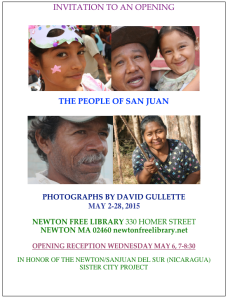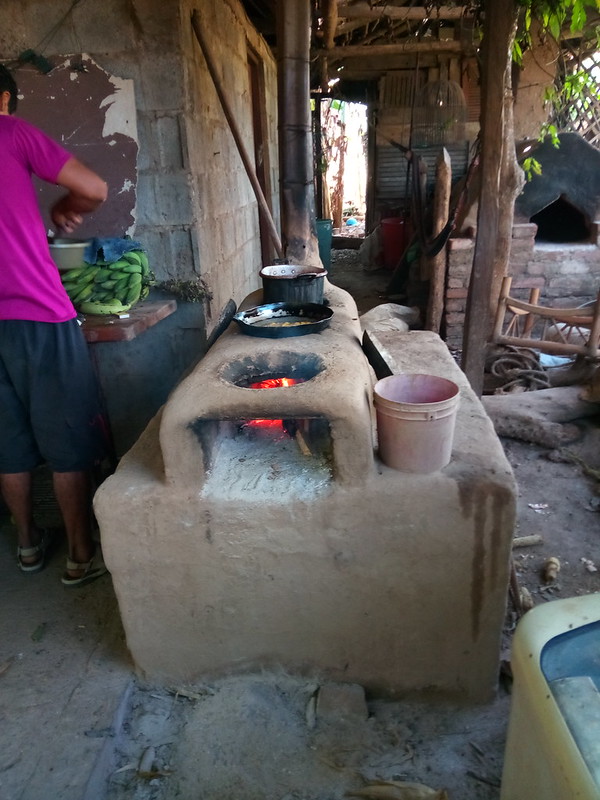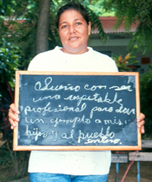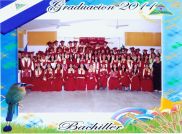AUGUST 2018: Despite the turmoil in Nicaragua, the Sister City Project continues its work with people who need it most. The all-clay EcoStoves (https://www.flickr.com/photos/gringopinolero/albums/72157662605616337) and the BioSand Water Filters continue to be fabricated by participating families, under the watchful eyes of Antonia Mendoza. And the Free High School for Adults keeps functioning, even at a time when many schools and universities in the country are closed. We keep faith with the people of Nicaragua.
Click here under OUR STORY to see a list of our MAJOR ACHIEVEMENTS in San Juan del Sur in the past 30 years. And click here to see the FALL 2018 NEWSLETTER.
OCTOBER 2017: RURAL COMMUNITIES IN SAN JUAN DEL SUR DEVASTATED BY HURRICANE NATE. WE ARE ROUTING CONTRIBUTIONS FROM OUR 100% TAX-DEDUCTIBLE SITE TO RELIEF EFFORTS LED BY THE PATRICIA CLAEYS FOUNDATION. HELP OUT BY CLICKING https://sanjuandelsursistercityproject.wordpress.com/contribute/
FOR CURRENT NEWS OF OUR ACTIVITIES GO TO
https://www.facebook.com/NewtonSanJuanDelSurSisterCity
CURENT NEWSLETTER NOW AVAILABLE: GO TO RECENT NEWS CLICK HERE
THESE GLASS-FRAMED PHOTOS OF FOLKS FROM SAN JUAN DEL SUR ARE NOW FOR SALE. CLICK HERE TO SEE THEM AND READ THE CAPTIONS. TO SEE PRICE LIST AND LEARN ABOUT DELIVERY OPTIONS, CLICK HERE.

This is Yeseling Ariana Solis, 23 years old, in the restaurant where she cooks.

Yeseling Ariana is married and lives outside of town. She had a baby boy following a high-risk pregnancy during her fourth year of high school, but there was no one at home to take care of him. Yeseling, determined to finish school come hell or high water, got through her senior year in 2014 by walking into town with her baby, Yerik, early every Saturday morning and caring for him throughout the day in the classrooms. “If I had to take him out, I did. He wasn’t the only disturbance. Other students make noise too and talk to each other.”
Yeseling had been a victim of domestic violence as a child. Her parents separated when she was six-years old and her grandmother raised her in a house where there was never enough money. After she got her sixth-grade diploma at thirteen, she went to work washing clothes in the houses of strangers. When she was 17 she met the man who she would later marry, and he supported her in that he was willing to buy her notebooks and clothes so she could go back to school on Saturdays. On weekdays she was a street vendor, selling pretzels, powdered cornmeal, and pinol (a rural drink) that she made herself. After Yerik was born, she continued to do this while pushing him around in a carriage.
Two months after graduation, Yeseling started working six days a week cooking at a fast-food place in San Juan del Sur and was finally able to give up street vending. She aspires to run such a business someday, and her new boss encourages her and plans to give her more responsibility. She would also like to study drawing. In the meantime, Yeseling is repairing her small family home in Rivas by taking out micro-loans from the government. “Although drowning in difficulties,” a Free High School administrator said, “she sees our center as a life raft because it permitted her to receive an education and graduate.”
Without the Free High School, Yeseling might still be washing clothes or selling snacks on the streets. Now she is educated, has a decent job, and is progressing down a rewarding career path. Most importantly, she is empowered. This is the kind of difference in people’s lives that we’ll be making by supporting the school. Thanks for being part of that difference.
And read about us in MassRealty: http://www.massrealty.com/articles/helping-our-friends-overseas,-part-1-featuring-san-juan-del-sur-city-project.
San Juan del Sur, Nicaragua has enjoyed a “Sister City” relationship with Newton, MA since 1988. For over a quarter century, the Newton/San Juan del Sur Sister City Project has pursued its mission of improving health and education in tandem with grassroots organizations and dedicated individuals there. We have financed the building or renovation of over twenty schools, improved the health of communities surrounding San Juan bay by bringing simple, eco-friendly technologies to the families of San Juan, and offered literacy programs and adult education programs to hundreds of people who are excluded from the regular school system. These efforts are changing the health, economy, and culture of the region.
In 2013 the Free High School graduated another 74 students, for a total of 616 since 2002. In 2014 we admitted over 800 students, via the rural high schools, the in-town or “Saturday School,” and the Technical Institute. For the first time, the City Council and the Ministry of Education are offering partial subsidies for these programs.
Two recent projects are the installation of BioSand Filters for purifying contaminated well water, and EcoStoves, for cooking with wood without filling the home (and folks’ lungs) with smoke. The photos in the slideshow below showcase communities where one or both of these initiatives were underway in 2010/2011.
UPDATE: SPRING 2014: A new approach to Filters and Stoves. We’ve decided on a new strategy to bring BioSand Filters and EcoStoves to folks out in the campo (rural areas). Instead of making the filters and stoves in town and then delivering them, we tried moving all the fabrication of these wonderful appliances out to one rural village, Bernardino Ochoa, inviting folks from three communities–Bernardino Ochoa, Papaturro, and Coyolito–to come and build their own stoves and filters. So many people wanted to work that we had to assign different work days to different people. By mid-February we had built 60 filters and 60 stoves and had begun to install them. You can see people involved in the different tasks (making iron grids for the stove boxes, producing compressed earth blocks to put between the two layers, putting cement into molds that hold large plastic bottles wrapped in chicken wire to make the “legs” that hold up the stove, sifting sand for the filters, assembling the filters, and so on) at http://www.flickr.com/photos/gringopinolero/sets/72157639993257513/
We finished the three-village project so quickly (three weeks total) that we moved production of stoves out to the village of Las Brisas, south of town, where a youth group from the Woodstock, VT Rotary will help build 24 stoves they have chosen to finance. Photos at http://www.flickr.com/photos/gringopinolero/sets/72157641215576133/
See SEPTEMBER 2013 UPDATES on RECENT NEWS page!
See our Spring 2013 Newsletter!
This slideshow requires JavaScript.
MORE NEWS FROM 2013: SEE OUR “RECENT NEWS“!
SPRING 2013: Our March 22nd “12 by 12” art show and silent auction brought together many Sister City Project supporters, local artists, past travelers to SJDS, educators and friends, and raised much-needed funds for the Free High School for adults.
SUMMER 2012: We’ve completed our second “Green Preschool,” this time in the village of San Antonio de Baston. See a slideshow about the building project including the school plus the “Comedor” or lunch room, constructed using locally-sourced, sustainable materials.

Dozens of new pupitres ready for use
January 2011: The rural students of the Free High School and their teachers usually meet in elementary schools in the villages where we offer classes. This means that the chairs with arms (pupitres) are sized for children between the ages of six and thirteen, and too small for many of our adult students. Many chairs are old and falling apart. We needed new pupitres of the right size. Newton Highlands Congregational Church came through for us, purchasing over eighty in 2010.
Thanks to Rodney Barker, Lynn Scheller, Carol Carroll, and other members of the Mission Ministry: Marianne Talis, Heidi Frimanis, Carol Jensen, Marian Reynolds, and Lynne Sullivan.
The chairs are made in San Juan del Sur of certified wood that has been cut down according to ecological standards set by the Nicaraguan environmental agency. They were made in the workshop of Jose Ruiz, out of two hardwoods, laurel and roble.











